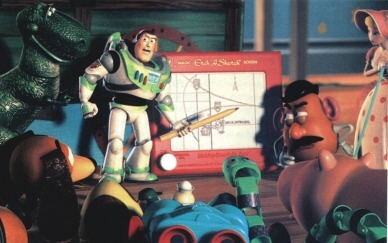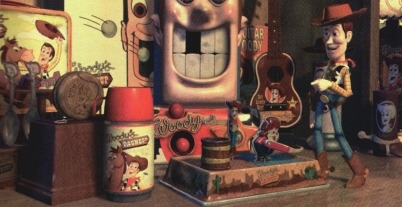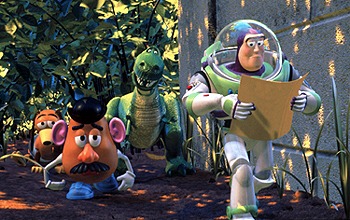

11/28/99
Over the Thanksgiving holiday weekend, I watched the three Ray Harryhausen Sinbad movies, shown in a row one night on cable. These are old movies (spanning the years from 1957 to 1977) featuring stop-motion-animated monsters. Monsters of the most wonderfully ridiculous sort - cyclopian giants, two-headed birds, a dragon chained to a dungeon wall, fire-juggling ghouls, saber-tooth tigers, sword-wielding skeletons, even a giant walrus(!). The three films - The Seventh Voyage of Sinbad, The Golden Voyage of Sinbad, and Sinbad and the Eye of the Tiger all featured mysterious islands, hidden temples, beautiful women, bad acting and complete absence of plotline. But there's a key line in the last of the Sinbad films: "Every voyage has its own flavor." Despite their overall similarity, I still prefer the first and second films over the third. Why? There's no real accounting for taste.
The same sort of thing happened to me with Toy Story 2. The first Toy Story film is IMHO as perfect as a film can be. Some have said that the sequel is even better. How could it be, I wondered.
Let me backtrack. For those of you who haven't been paying attention, the first Toy Story movie is about a bunch of toys owned by a kid named Andy. We meet Woody the cowboy (voiced by Tom Hanks), Buzz Lightyear (Tim Allen), plus Mr. Potato Head, Slinky Dog, Rex the dinosaur, Bo Peep, and little green army men. In the course of various adventures, Buzz, who is a spaceman, has a moment of lucidity. He realizes after all that he is NOT an intergalactic hero equipped with laser beams and flying wings, battling the fiendish plots of the evil Emperor Zurg. Rather, he is just a toy, a plaything. But then he realizes that to be a plaything means to be loved by a child, and what can beat that?
The first Toy Story film was about Buzz; the second is really about Woody. And here, for me, is where I really have to give the edge to the first film. First of all, my natural inclination is toward space things. Anything with a rocketship or a flying saucer or ray gun or jet pack has my immediate and undivided attention. The scene in Pizza Planet in the first film was an endless delight - especially the brilliant shot of the Whack-A-Mole with chestbursters from Alien subbing for moles.
Toy Story 2 focuses on Woody and his cowboy friends and roots. Was never much into western themes myself. Oh well, I also prefer Dr. Pepper to Pepsi. It's a flavor thing. In any case, this is Woody's story, as told in this film: Woody, unbeknownst to him, is a rare collectible toy. It so happens that Woody was the star of a puppet TV show back in the fifties. The show was canceled mid-adventure after the launch of Sputnik turned American kids' attention away from horse operas to space operas. But in his heyday, Woody appeared on yoyos, bubble-makers, books, and even the cover of Life magazine. When Woody is confronted with this Truth and sees, for the first time, all this memorabilia with his face on it, the effect is startling. The revelation culminates with the tiny Woody staring up at a huge cardboard cut-out towering above him like a billboard. For me, the scene made me think of what Heaven would be like, when we finally behold our true nature, transfigured by God, glory revealed in us.
 Woody
in heaven
Woody
in heaven
The lesson that Woody learns in Toy Story 2 is the corollary to what it means to be loved by a child: Someday that child will stop loving you. Though you are played with every day through spring and summer, eventually you will be forgotten and abandoned. Jesse the Cowgirl (voiced by Joan Cusack) was a friend of Woody's back in the 1950's. She sings a heartbreaking song (borrowing the voice of Sarah McLachlan) called "When She Loved Me" all about how Jesse was the favorite toy of a girl named Emily. Then Emily grew up, and nail polish and lipstick replaced her toy horses. Jesse spends years gathering dust under a bed until she who once was My Favorite Toy is left in a box at Good Will. It's a powerful, horrifyingly sad song that pretty much reminds us of the awful truth that most any love we have, no matter how precious and powerful and wonderful it once was, can one day slip away.
This is the main difference - in flavor, if you will - between the first and second Toy Story movies. In this second movie, we learn that love dies. We also learn other unsettling and unhappy lessons. We find out that Big Al of Big Al's Toy Barn isn't a jolly fat man in a chicken suit in the TV ads, but a pathetic, money-grubbing slug of a man. We learn that not all toys have that moment of lucidity when they learn that they are toys - and thus they live in eternal ignorance of their truth nature. We also learn that toys get worn out and accidentally ripped apart - and then thrown away. Hard lessons.
It seemed to me to be a lot like the story of Falstaff. In Shakespeare's Henry IV, Part I, we meet and fall in love with this jolly fat man who cracks jokes and drinks beer (not unlike certain characters in a Boston bar). But in the sequel, Henry IV, Part II, we find Falstaff now just an aged gray fool. His former drinking buddy, young Prince Hal, has learned life lessons Falstaff hasn't. And at the end of the play Hal, now crowned King Henry V, dismisses the pathetic boozer with the cruelest of lines, "I know thee not, old man." Different flavor, indeed.
Series of plays and movies, even with almost the same set of characters, can have different flavors. But that doesn't mean I have to like them. Toy Story 2 is a great movie, with characters with depth, with interesting dialog, with a plot that moves along and only occasionally takes unnecessary side routes into silliness, with a cool, fast-paced (space-themed) opening sequence. That doesn't mean I have to love it. I also know Martin Scorsese films are great. But that doesn't mean I have to like them or the people in them. I couldn't tell you a single thing wrong with Goodfellas, but I hated that film, because it reminded me of all the bullies I hated in grammar school - but now the bullies have lawyers, guns and money.
Toy Story 2 is like that. It's a great movie, wonderfully put together, with no outstanding flaws, and yet I didn't fall in love with it the same way I did with the first film. It's not that I didn't appreciate the lesson (yes, I know from personal experience that love dies). It's just that it wasn't my favorite flavor. I like Dr. Pepper more than Pepsi. I don't like sour Gummi worms but other people love them. It's all up to you what you like. It's a free country.
Before I end this review I should note, for the record: Yes, the computer animation in Toy Story 2 is wonderful. Of course it is.
Overall: 9.5/10
Agree or disagree? Please email me.

From David Litchfield:
Hi,
I came across your article on Toy Story 2 whilst searching the net for articles about Falstaff and much of what you said rang true about Toy Story 2. You've said in a couple of places in your article "no accounting for taste." On the contrary, when you boil things down to basics, perhaps you can account...
I read the other day an essay written by Gerard Manley Hopkins, one of the greatest English poets of the late 19th C. "On the Origin of Beauty." If you can get a hold of it, it's worth a read.
David Litchfield
Back to Kitsch Tour U.S.A.
Back to Official Frank Wu Homepage